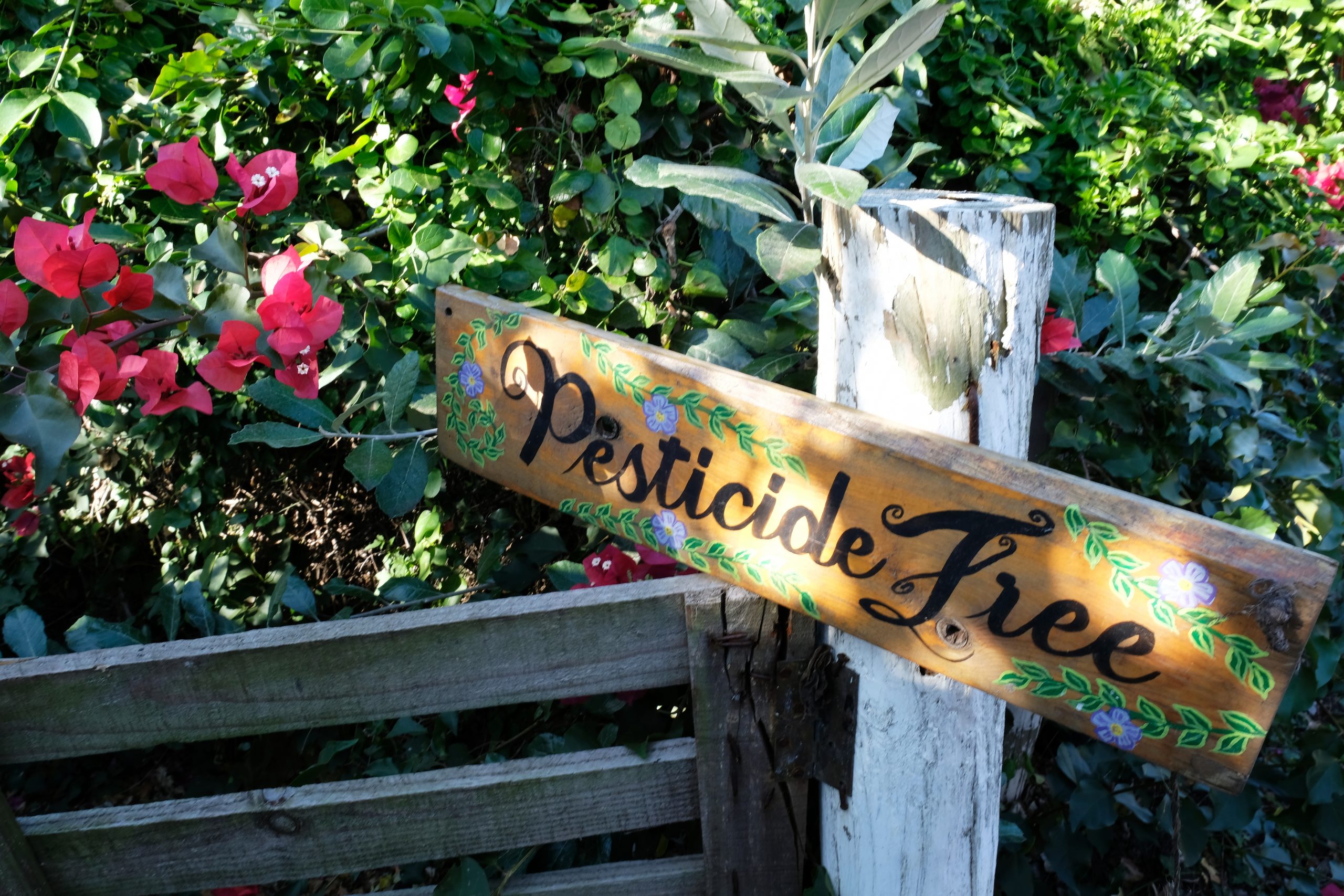DID YOU KNOW?
Less than 3% of the insects you encounter in the garden are pests. The vast majority of insects in your yard are not harmful – they’re either beneficial or neutral. In the interest of keeping good bugs alive, take a targeted, selective approach to dealing with the insects that are pests.
Pesticides & Water Quality
Commonly used pesticides have been detected in urban creeks and waterways throughout California and around the country. Pesticides can cause problems for our health and the environment even when applied according to label directions. Very small amounts of pesticides can be lethal to marine life, birds, and other life forms. In some locations, water contaminated with pesticides can migrate from creeks and surface waters into drinking water wells.
When you apply pesticides, you’re treating the symptom, rather than the cause of pest problems. That’s where Integrated Pest Management comes in.
Integrated Pest Management
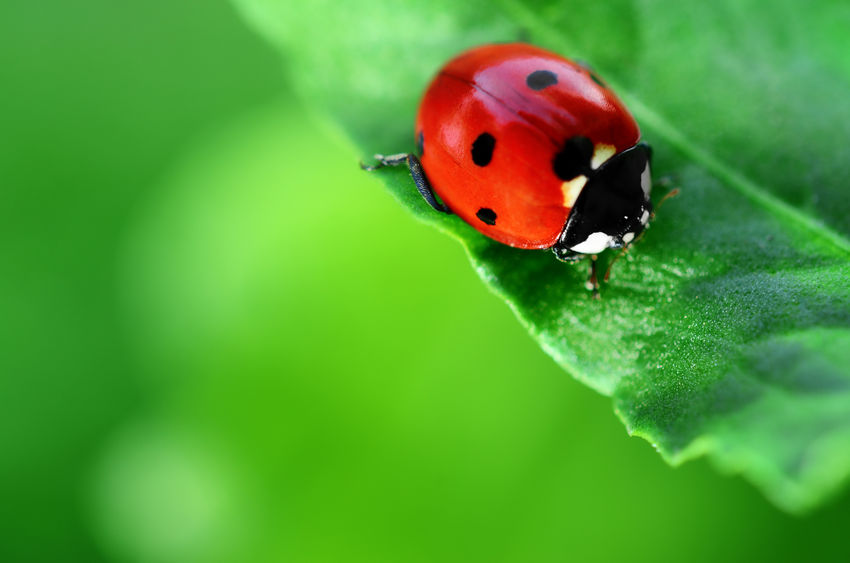
Integrated Pest Management (IPM) is a strategy that emphasizes less-toxic control solutions that have the least environmental impact to keep pests at acceptable, low-levels. See the below section for a list of local IPM pest control operators, and for information not found on this page, check out the Statewide Integrated Pest Management Program’s website.
The best way to prevent pests is through a combination of the following controls:
- Biological Control: Almost everything in nature has something that can bring it down. Whether it’s a natural predator, parasite, pathogen, or competitor, effective pest control can be as easy as identifying the pest damaging your garden and introducing a natural enemy like ladybugs. Check out this list of predators and parasites that kill pests naturally.
- Cultural Control: Pests tend to thrive in specific environments and conditions. If you’re experiencing a persistent pest problem, it might be time to consider what environmental condition you might be creating that supports their continued survival. For example, changing irrigation practices can reduce pest problems, since too much water can increase root disease and weeds.
- Mechanical & Physical Controls: These controls kill a pest directly, block pests out, or make the environment unsuitable for infestation. Traps for rodents are examples of mechanical control. Physical controls include mulches for weed management, steam sterilization of the soil for disease management, or barriers such as screens to keep birds or insects out.
- Chemical Control: When taking a responsible approach to pest management, pesticides should only be used as a last resort and always in combination with the controls listed above. It’s generally a good idea to use pesticides in bait stations rather than sprays, and to spot-spray instead of spraying an entire yard or area. Pesticides should be selected and applied in a way that minimizes their possible harm to people, non-target organisms, and the environment. NEVER use pesticides or herbicides when there is rain in the 48-hour forecast and ALWAYS avoid application in windy conditions.
IPM Videos
The below videos explain the integrated pest management process in detail and provides a lot of great tips and useful content.
IPM Pest Control Operators

IPM pest control operators look at environmental factors that affect current pests and their ability to thrive, rather than simply eliminating pests that are merely visible upon inspection, which often doesn’t get to the root of the problem. Below are some pest control companies that use IPM strategies and service the San Mateo County area. Note – the Flows To Bay program does not endorse these companies or their practices but provides the list as an informational resource to the public.
Alert Pest Control Co., Inc.
Structural Pest Control
Phone: (877) 302-8886
Email: info@alertpestcontrol.com
Website: alertpestcontrol.com
Offers: IPM services. Provides full service pest control, but no termite service.
Applied Pest Management Inc / Paratex Termite
Landscape and Structural Pest Control
Phone: (800) 244-1176
Email: apm@appliedpestgtmgt.com
Offers: IPM services, LEED services, general pest control, termite and bird control. Termite treatment and repairs
Crane Pest Control
Structural Pest Control
Phone: (415) 922-1666
Email: servicemanager@cranepestcontrol.com
Website: cranepestcontrol.com
Offers: IPM services. Provides commercial general pest control services.
Donovan’s Pest Control, Inc.
Structural Pest Control
Phone: (877) 302-8886
Email: customerservice@controlpests.com
Website: purcorpest.com
Offers: IPM services. Provides full service pest control, but no termite service.
Genesis Building Services, Inc.
Structural Pest Control
Phone: (800) 547-2847
Email: info@2genesis.com
Website: 2genesis.com
Offers: IPM services. Provides general pest control services for commercial and pharmaceutical facilities.
One Source Termite Control
Structural Pest Control
Phone: (415) 850-9368
Email: Onesourcetc@yahoo.com
Offers: IPM services. Provides general pest control and termite services.
Performance Pest Management
Structural and Landscape Pest Control
Phone: (925) 271-5736
Email: Katie@performancepest.com
Offers: IPM services. GreenPro Certified. Provides full service pest control, but no termite service.
Pestec Pest Control South Bay
Structural and Landscape Pest Control
Phone: (408) 564-6196
Email: mikail@pestecipm.com
Website: pestecipm.com
Offers: IPM services. Green Shield & EcoWise Certified. Provides full service pest control, but no termite service.
Other Resources to Locate a Pest Management Professional
- EcoWise Certified professionals use prevention-based pest control practices. They use their knowledge of how pests live, feed, reproduce and move to effectively solve pest problems.
- Green Shield Certified is an award-winning, independent, non-profit certification program that promotes practitioners of effective, prevention-based pest control while minimizing the use of pesticides.
- Green Pro Certified is offered by the National Pest Management Association (NPMA)
- Tip sheet for finding a company that can prevent pest problems safely and in an eco-friendly manner.
Our Water Our World
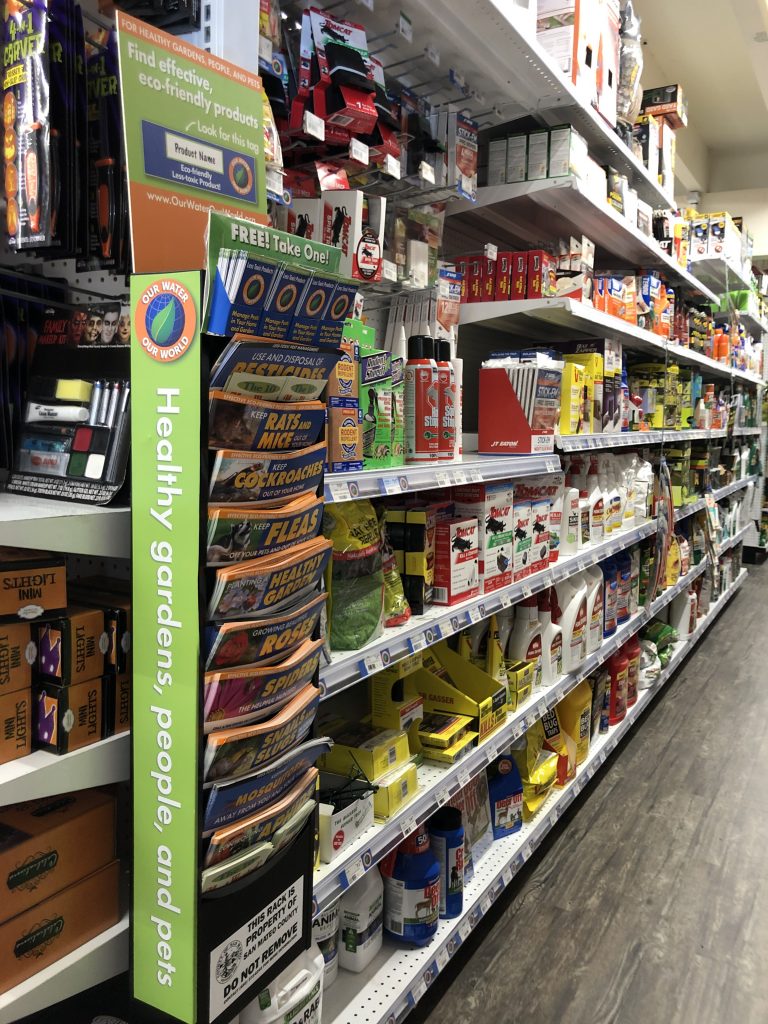
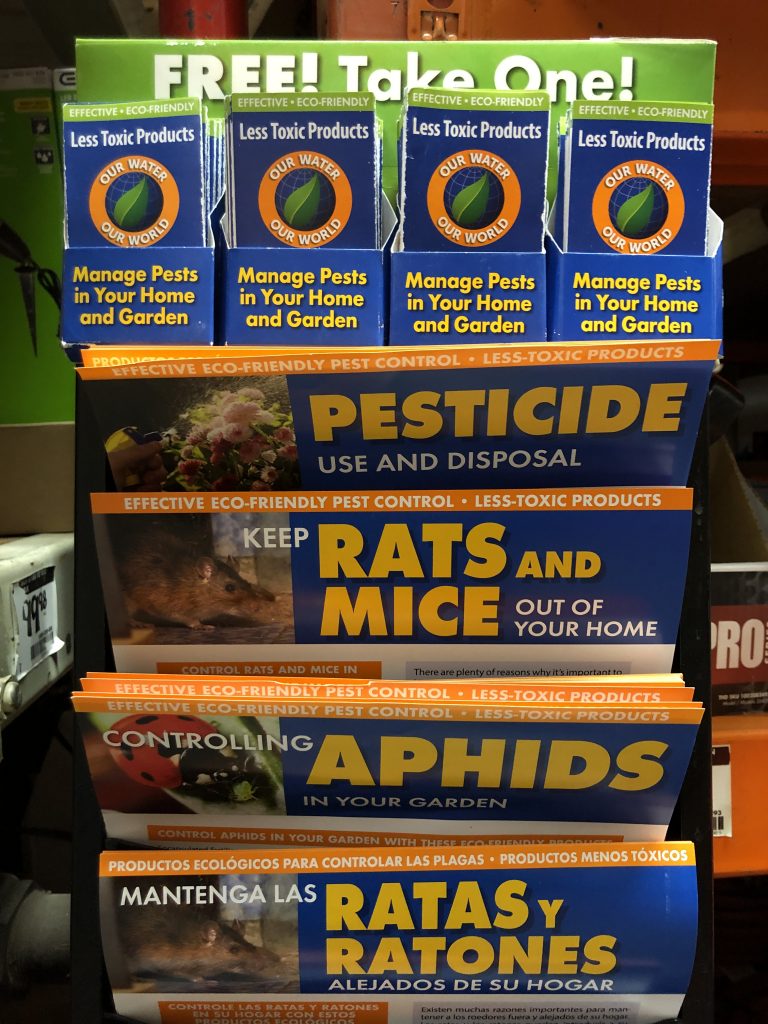
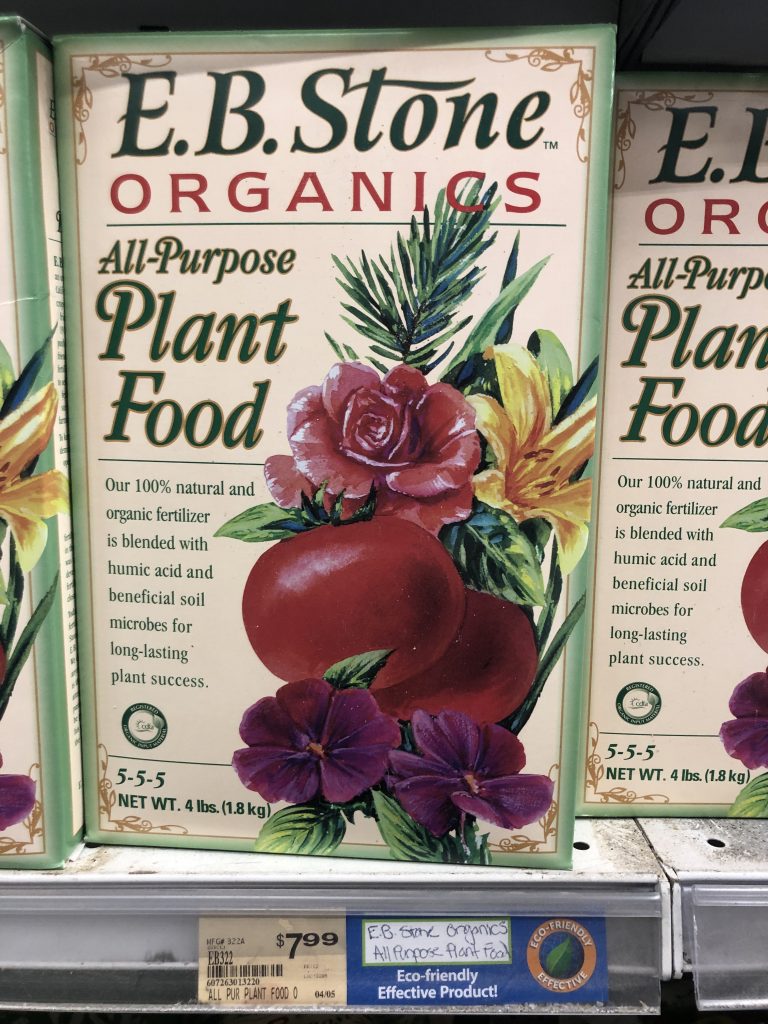
Flows to Bay has partnered with Our Water Our World (OWOW) to make information on less toxic pest control and gardening products more accessible to the residents of San Mateo County. You can find information about specific pests on fact sheets placed at hardware stores across the county (see below for a list), and choosing a pesticide is as easy as looking for this OWOW shelf talker. You can also click here to find a list of less-toxic and non-toxic pesticides.
Look for Our Water Our World Materials in these stores!
If You Must Use Pesticides
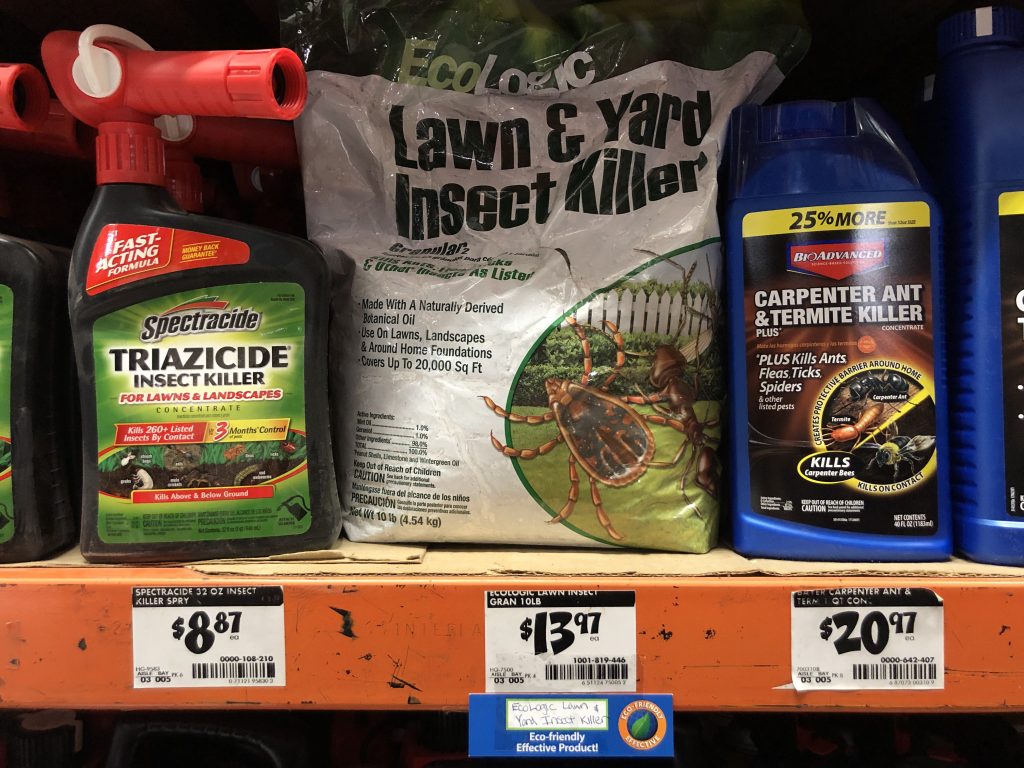
- Identify the pest and the afflicted plant, and then choose a product labeled for use on that pest and plant. Not all pesticides are effective against all pests.
- Choose the least-toxic product available, such as horticultural oils and insecticidal soaps. Enclosed baits and traps are safer options.
- Buy ready-to-use products instead of concentrates. In addition to being less toxic because they are diluted, ready-to-use products avoid spills because you don’t need to measure or mix the product.
- Avoid sprays. Aerosol sprays in particular increase the risk of exposure to beneficial insects, birds, pets, you, and your family.
- Use only the amount recommended on the label to do the job. More is not better.
- Spot-treat whenever possible.
- Don’t use pesticides outdoors when rain is predicted, or just before you water your lawn or garden.
- Pesticides, whether tracked in from outdoors or used inside, can contaminate carpets and floors where children play. If you apply pesticides outside, you can carry chemicals inside on your clothing and shoes. Pets can also be carriers.
- Store pesticides in their original containers, and keep the label on the product. Follow all storage instructions on the label.
- Do not store pesticides where flooding is possible or in places where they might spill or leak onto the ground or into water.
Safe Pesticide Disposal
Pesticides are considered household hazardous waste and must be taken to your local hazardous waste facility. Please note that empty containers are not hazardous waste and can be recycled. Leave the lids off so waste haulers can see that the container is empty and non-hazardous. Never dispose of pesticide rinse water in any indoor or outdoor drain.
